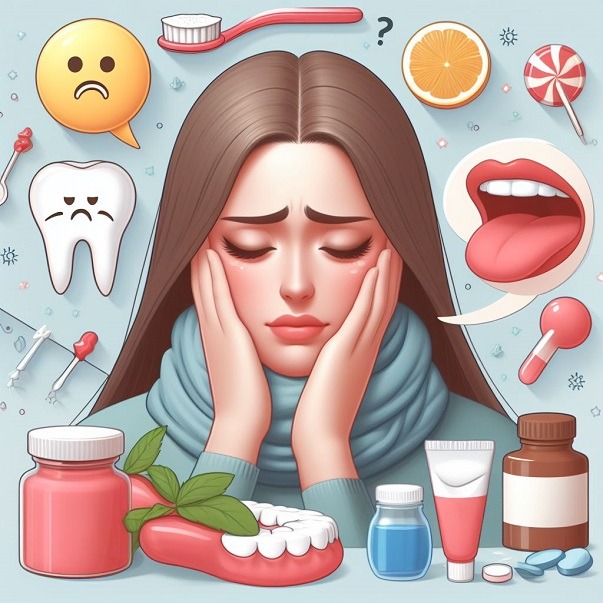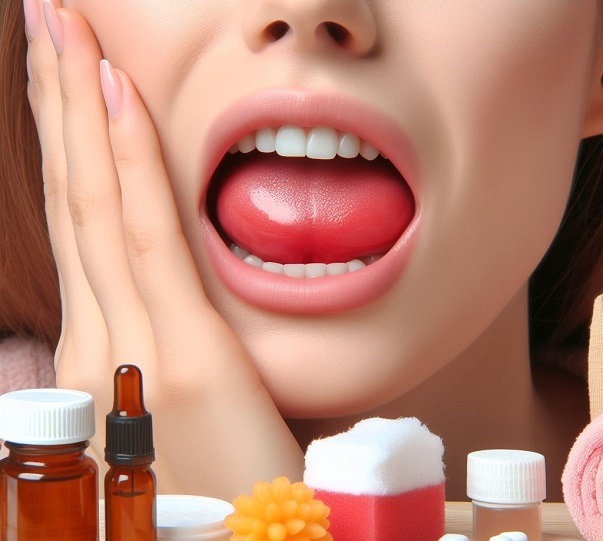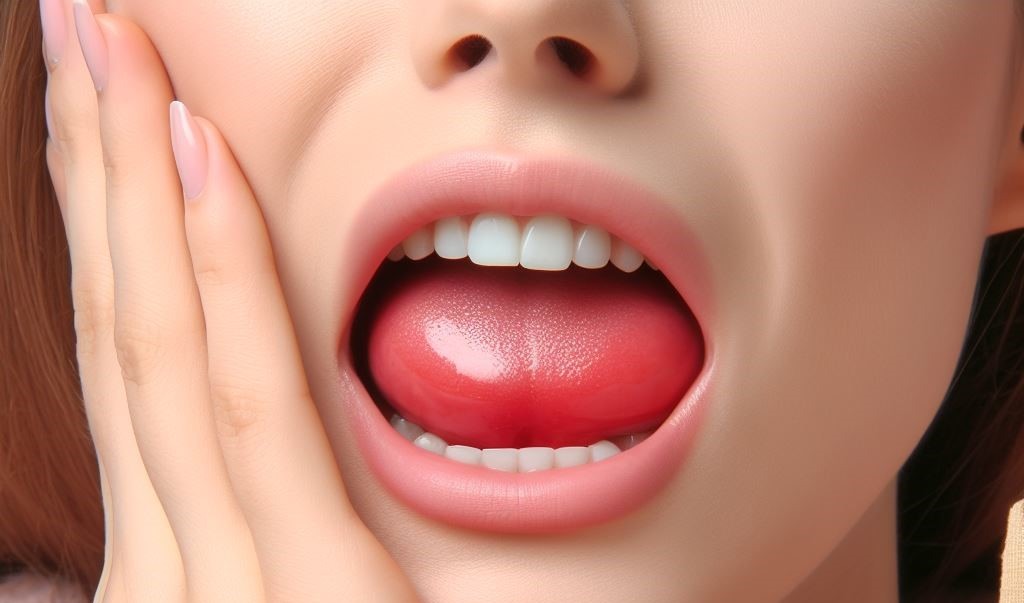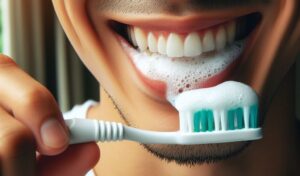Exploring the reasons behind “why is the roof of my mouth swollen” reveals that this discomfort can stem from reactions to hot foods, allergies, infections, or various health conditions. This swelling is your body’s way of signaling that all is not well, prompting you to reevaluate your oral habits and consider seeking remedies or professional advice if the pain or swelling persists or worsens.
Ten reasons why is the roof of my mouth swollen
Let’s dive into the ten reasons why is the roof of my mouth swollen.

1. The Too-Hot-To-Handle Foods
Yes, we’ve touched on this, but it’s worth repeating. Hot foods and liquids can cause immediate swelling. The fix? Let that coffee cool a tad, and maybe don’t dive into the pizza the second it comes out of the oven.
2. Sneaky Food Allergies
Food allergies or sensitivities can be silent but deadly when it comes to swelling in the mouth. It might be time to play detective with your diet to figure out if something specific is causing the issue.
3. The Sinus-Oral Health Connection
Sinus infections can lead to swelling in the roof of your mouth due to the proximity of your sinuses to your oral cavity. Keep those sinuses clear to avoid unnecessary pain.
4. Dental Drama
Issues like tooth abscesses or gum disease can contribute to swelling in the mouth. Good oral hygiene and regular dental check-ups are your best defense.
5. Smoking Signals
Smoking doesn’t just harm your lungs; it can also irritate the mouth, leading to swelling. Another reason to consider kicking the habit.
6. Dehydration Dilemma
Not drinking enough water? Dehydration can affect your mouth’s health, including causing the roof to swell. Keep that water bottle handy.
7. Vitamin Deficiency
A lack of certain vitamins, like B12 and C, can lead to oral health issues, including swelling in the mouth. Consider a diet rich in these vitamins or supplements if needed.
8. Infection Invasion
Bacterial, viral, or fungal infections in the mouth can cause swelling. Good oral hygiene and avoiding sharing eating utensils can help prevent these.
9. Injury Insight
A direct injury to the mouth, like a cut or burn, can cause immediate swelling. Be mindful of chewing and avoid putting non-food items in your mouth.
10. Stress Strain
Believe it or not, high stress can manifest physically in your body, including causing swelling in the mouth. Finding ways to reduce stress can help alleviate this issue.
Also read: Why teeth hurt when drinking cold water
Symptoms of Mouth Swollen
Let’s break down these symptoms, turning the confusing signals into clear signs that it’s time to take action, or at least pay a bit more attention to what your body is trying to say.
Pain and Discomfort
Whether it’s a dull ache that hangs around like a bad weather forecast or sharp zings that remind you of lightning strikes, pain is a major red flag. It can radiate from one area of your mouth to another, making you dread your next meal or even a simple sip of water.
Difficulty Eating or Swallowing
Ever taken a bite of your favorite food only to find that chewing feels like a workout? Or maybe swallowing seems like you’re trying to gulp down a golf ball. These are classic signs that swelling is throwing a wrench in your eating and swallowing game.
Altered Taste or Foul Taste in the Mouth
Imagine sipping your go-to morning beverage and finding it tastes like you’re licking a battery. A metallic or foul taste in your mouth, especially if it sticks around, can be a symptom of infection or other issues linked to swelling.
Sensitivity to Temperature or Spices
If a scoop of ice cream or a sip of hot coffee sends your mouth into a frenzy, or if that spicy taco tastes like it’s packed with dynamite, congratulations! Your mouth is on high alert, and sensitivity is through the roof—literally.
Bad Breath That Sticks Around
Persistent bad breath that doesn’t wave goodbye after brushing and flossing might be crashing at your place because of swelling-related issues. It’s more than just a social inconvenience; it’s a hint at underlying problems.
Visible Redness or Sores
Sometimes, your mouth decides to showcase its issues in full color. Redness, sores, or ulcers that pop up without an invitation are not just visible symptoms but are also tactile billboard advertising that all is not well in your mouth.
Feeling of Fullness or Pressure
This one’s tricky. It’s like when you’ve eaten enough, but there’s no food in sight—just this odd, pressure-filled sensation that makes you feel like you’re sporting an invisible mouthguard.
Difficulty Speaking Clearly
When swelling steps in, articulating words can suddenly feel like you’re speaking with a mouth full of marbles. If “How now brown cow” starts sounding like “Huh nou bruh cah,” swelling might be playing with your speech.
General Fatigue or Malaise
Feeling off but can’t quite put your finger on it? Sometimes, the symptoms of a swollen mouth go beyond the mouth itself, making your whole body feel like it’s in a slow-motion setting.
Also read: Yellowing on the Roof of Mouth
Home Remedies and Immediate Relief
Let’s explore these friendly options that your mouth will thank you for.
Cool Water Rinse
Starting with the basics, a gentle rinse with cool water can work wonders, especially if the swelling is due to a burn from hot food or drink. This immediate action helps soothe the burn and reduce inflammation quickly. Remember, we’re talking cool, not cold, to avoid shocking your sensitive mouth tissues.
Saltwater Swish
A saltwater rinse is like an old friend – reliable and comforting. Dissolve a teaspoon of salt in a cup of warm water and gently swish it around your mouth. This not only reduces swelling but also fights against infection, thanks to salt’s natural disinfectant properties.
Chamomile Tea Compress
Chamomile isn’t just for a relaxing tea time; it’s also a fantastic anti-inflammatory agent. Brew a strong cup, let it cool down, and then use it as a mouth rinse or soak a clean cloth in it and gently apply it to the swollen area. It’s a natural way to reduce swelling and soothe discomfort.
Aloe Vera Magic
Aloe vera is a powerhouse of healing properties, especially when it comes to skin and mucous membrane issues. Applying aloe vera gel directly to the swollen area can help soothe and reduce inflammation. Just be sure it’s the edible kind and free from additives.
Honey’s Soothing Touch
Honey is nature’s ointment, thanks to its antibacterial and healing properties. Dabbing a little honey on the swollen area can help reduce inflammation and prevent infection. Plus, its sweetness is a nice bonus!
Turmeric Paste
Turmeric is a well-known anti-inflammatory and antiseptic spice. Making a paste with turmeric and water and applying it to the affected area can help reduce swelling and fight infection. Just be prepared for a temporary golden smile!
Cold Compress
Sometimes, you need to chill out – literally. Applying a cold compress on the outside of your mouth can help reduce swelling and numb the discomfort. Just wrap some ice in a clean cloth (never apply ice directly to your skin) and hold it against your cheek for short intervals.
Clove Oil
Clove oil has been used for centuries to treat oral pain and inflammation. A drop or two applied to the swollen area can reduce discomfort. It’s potent, so use it sparingly and diluted with a carrier oil if you have sensitive skin.
Stay Hydrated
Drinking plenty of water is crucial, not just for overall health but also to keep your mouth hydrated. This can help reduce swelling and promote healing. Avoid alcoholic and caffeinated beverages as they can dehydrate you.
Avoid Irritants
While you’re dealing with swelling, it’s wise to avoid things that can exacerbate the issue. Spicy foods, acidic drinks, and tobacco products can further irritate your swollen palate. Opt for soft, bland foods until the swelling subsides.
Also read: Tooth Powder Recipes at Home
Can Eating Too Fast Cause the Roof of My Mouth to Swell?
You betcha. Speed-eating that steaming hot slice of pizza or gulping down that just-boiled tea can not only burn but also lead to swelling. Slow it down, savor the flavor, and give your food a moment to cool. Your mouth will thank you.
When to See a Dentist
So, let’s talk about when it’s time to stop Googling “home remedies for mouth swelling” and start dialing your dentist.
Persistent Swelling Doesn’t Play Nice
If the swelling in the roof of your mouth lingers like an unwanted guest, refusing to leave after a few days, it’s time to consult your dentist. Persistent swelling is a signal from your body that something out of the ordinary is happening, and it requires professional attention.
Pain That Won’t Quit
Pain is your body’s alarm system, and if it’s ringing loud and clear without a snooze button in sight, you need to listen. When the discomfort becomes more than a minor annoyance and starts affecting your daily life, eating, or sleep, it’s a clear sign to seek dental advice.
Signs of Infection: Red Flags Flying
Watch out for signs of infection around the swollen area, such as increased redness, warmth, pus, or a foul taste in your mouth. These symptoms indicate that your body is fighting an invader, and it might need backup in the form of antibiotics or professional dental care.
Difficulty Swallowing or Breathing
This one’s a no-brainer but worth emphasizing. If you’re having trouble swallowing or, worse, breathing, due to the swelling, it’s not just a dental emergency—it’s a medical one. Head to the nearest emergency room or call emergency services immediately.
Fever: The Heat Is On
A fever accompanying a swollen palate is like a big, flashing neon sign that says, “Help Needed.” It suggests your body is battling an infection that could be spreading. Don’t wait it out; your dentist or doctor needs to be in on this fight.
Odd Lumps and Bumps
Not all swellings are created equal. If you notice a lump or bump that feels different from the surrounding area, especially if it’s hard or doesn’t move, it’s time for a professional evaluation. It’s probably nothing serious, but it’s better to play it safe.
Bleeding Without Cause
If your swollen area starts to bleed without any apparent reason (like brushing a bit too enthusiastically), it’s a sign that something’s amiss. While the cause might be benign, bleeding can indicate more serious conditions that require dental intervention.
Unexplained Loose Teeth
A swollen palate accompanied by loose teeth is a dental double whammy. It could indicate periodontal disease or other serious conditions affecting your oral health. Your dentist can help figure out the cause and the best course of action.
Bad Breath That Won’t Brush Off
Persistent bad breath, even after brushing and flossing diligently, can be a sign of infection or decay lurking beneath the surface. If your breath keeps knocking out your confidence despite your best efforts, let your dentist take a peek.
You Just Know Something’s Off
Sometimes, you just have that gut feeling that something isn’t right. Trust your instincts. If something feels off with your oral health, it’s worth getting a professional opinion. You know your body best.
Seeking timely dental care can prevent minor issues from becoming major ordeals. Remember, your dentist is your partner in oral health, not just someone you see for your bi-annual cleaning. When in doubt, reach out. They’re there to help keep your smile not just beautiful, but healthy too.
Why is the Roof of My Mouth Sore?

Let’s break down the whys behind a sore roof of your mouth and arm you with knowledge that’s more satisfying than your morning coffee—minus the burn, of course.
Hot Foods and Beverages:
It’s no secret that diving into your food or drink too soon can leave you with more than a bad taste—it can leave a mark, or in this case, a sore spot. The roof of your mouth is delicate, and scalding temperatures can cause immediate damage, leading to soreness and even blisters.
Spicy and Acidic Foods:
Love to live on the culinary edge with spicy tacos and lemony treats? Your taste buds might be in heaven, but the roof of your mouth could end up in a world of hurt. Spicy and acidic foods can irritate the delicate tissues up top, leading to soreness and inflammation.
Dental Appliances and Procedures:
Braces, dentures, and recent dental work can also be culprits behind a sore roof of your mouth. These necessary nuisances might save your smile, but they can also rub and press in all the wrong places, causing discomfort and sore spots.
Allergies and Reactions:
Food allergies, reactions to medications, or even seasonal allergies can manifest inside your mouth. This immune response can lead to swelling, soreness, and a generally unhappy palate. Keeping track of your reactions can help pinpoint the cause and tailor your diet or medication accordingly.
Infections and Diseases:
From the common cold to more serious conditions like oral thrush or hand, foot, and mouth disease, infections can turn the roof of your mouth into a battleground. These unwelcome guests can cause soreness, red spots, and even ulcers, making every bite a painful adventure.
Understanding the root causes of soreness in the roof of your mouth is the first step toward addressing the problem. Whether it’s adjusting your diet, improving your oral hygiene, or seeking medical advice, there’s always a way to ease the discomfort.
Will Brushing More Often Fix My Sore Palate?
While keeping your chompers clean is crucial, overdoing it, especially with a stiff-bristled brush, can irritate the sore spot even more. Stick to gentle brushing and maybe switch to a softer brush if you’re dealing with mouth soreness.
Conclusion
In conclusion, understanding “why is the roof of my mouth swollen” opens the door to not just identifying the myriad causes ranging from hot foods to allergies, but also empowers us with the knowledge to seek appropriate remedies and preventive measures. Whether it’s adjusting our eating habits, improving oral hygiene, or knowing when it’s time to consult a professional, recognizing the signs and symptoms linked to a swollen palate can significantly improve our oral health and overall well-being.
Also read
How Can I Brush My Teeth After Wisdom Teeth Removal?
Does Hot Chocolate Help You Sleep?
How To Get Rid Of Crunching Sound In Neck + Causes
17 Natural Remedies For Carpal Tunnel Syndrome
FAQs
Here are some common questions
Oh, absolutely. Stress can lead to all sorts of fun (note the sarcasm) physical reactions, including clenching your jaw or grinding your teeth in your sleep, which can make the roof of your mouth sore. Finding ways to chill out can help, both for your mouth’s sake and your overall well-being.
Not necessarily, but if your dentures are causing irritation or making the swelling worse, it might be a good idea to give your mouth a break and consult your dentist. They might need adjusting.
It could be. Not drinking enough water can leave your mouth feeling like the Sahara, making it more prone to irritation and swelling. Keep that water bottle handy and stay hydrated.





